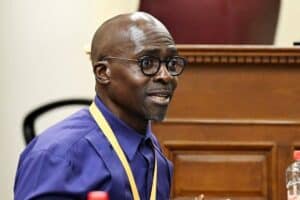'Mandela is Dead' exhibition challenges the narrative around the iconic leader's legacy as the world observes his 10-year death anniversary.

It’s been a decade since Nelson Mandela passed away at the age of 95 on 5 December 2013. The thought-provoking Mandela is Dead exhibition celebrates, as well as challenges, the legacy of South Africa’s first democratically elected president.
According to the Nelson Mandela Foundation (NMF), the exhibition – curated by artist and writer Kneo Mokgopa – seeks to “temper criticism of his legacy that has come from younger South Africans”.

ALSO READ: Malala Yousafzai to deliver Nelson Mandela Annual Lecture
‘Mandela is Dead’: Thoughts of freedom in an enamel cup
Mokgopa explained that the exhibition “invites” the audience to participate and contemplate “their deepest aspirations for freedom actively”.
One example is the installation of enamel cups where people are encouraged to whisper these hopes into a cup.
“Enamel cups hold a profound significance in our identity and culture. They have been pivotal in our most intimate cultural rituals, spanning weddings, funerals, memorials, and even conversations with our ancestors,” said Mokgopa.
ALSO READ: Payback time? Ndileka Mandela says British Royals must confess and cough up
‘Maybe we need to let him go’
“Any country with such a strong figure suffers for many years after the personality is gone from the deep nostalgia and this hanging on to that symbol,” said Verne Harris, the late and great statesman’s archivist and NMF acting president.
“What we are saying in this exhibition, is that maybe that becomes a destructive energy. Maybe we need to let him go. And look for new role models.”
ALSO READ: We need leaders of Madiba’s stature to take us out of current quagmire

The exhibition presentation highlights “the weight of the loss we suffered” with Madiba’s death.
As part of its efforts to help “process this grief”, it features interactive displays that encourage visitors to say what they think about Mandela’s heritage.
“We encourage discourse,” said NMF spokesperson Morongwa Phukubye. “We debate his legacy. His legacy isn’t one of a saint.”
ALSO READ: Mandela 10-year death anniversary: SA’s ‘moral compass’ vs quality of country’s democracy
Looking ahead: ‘Hope is not enough’
Harris told Africa News that NMF representatives encounter mixed reactions about Madiba when visiting townships and schools.
“We encounter narratives like ‘Mandela was a sellout and that’s why we’re in so much trouble today’,” said Harris.
“Or, ‘Madiba was a great leader and it’s a pity that his successors have been so poor’.”
Harris says most important lesson he learnt from Mandela is that “hope is not enough”.
“We need a deep belief that even if the future is worse than the present, we still have to keep fighting, keep doing what needs to be done. So you endure. That keeps me going a lot.”
- The ‘Mandela is Dead’ exhibition at the Nelson Mandela Centre of Memory, in Houghton, Johannesburg, is open to the public until 15 December.






